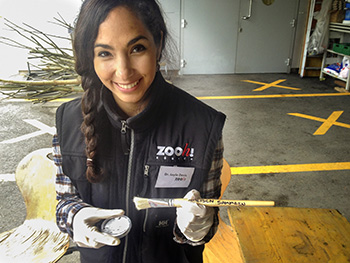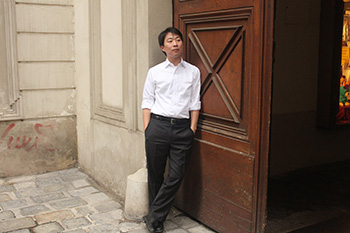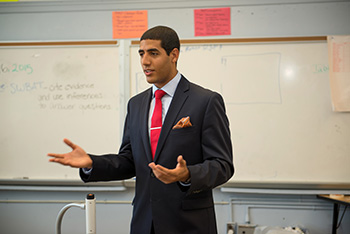Cover Story Sidebar
Making their mark: Undergrad research scholars drive discovery
Looking back, Leyla Davis '07 is still amazed that by age 19 she had already spent dozens of nights in the cloud forests of Costa Rica and Panama in search of red-eyed tree frogs. Today, the former Hunter R. Rawlings III Cornell Presidential Research Scholar is a Swiss National Science Foundation postdoctoral fellow at Imperial College in London and part of a multinational research effort to understand and mitigate the rapid decline of amphibian populations around the globe.
She also is one of some 800 students across Cornell's seven undergraduate colleges who have distinguished themselves as Rawlings scholars. Founded in 1996 and named in 2006 to honor Hunter R. Rawlings, president emeritus and now interim president, the program offers students a head start on gaining research experience by working closely with Cornell faculty.
"Two decades ago, we saw the Cornell Presidential Research Scholars Program as a way to attract the best college students in the country to Cornell by involving them in research from their very first undergraduate year," Rawlings recalls. "An impressive number of Cornell's early and recent presidential research scholars now contribute to innovation and to the solution of the world's problems through professional pursuits across an array of fields.
"I have no doubt that even more talented Cornell students would follow in their footsteps were we able to provide more scholarships and a level of support that reflects the rising cost of research," he says.
Kristin Ramsay '88, coordinator of the program in the Cornell Commitment office, has tracked the progress of scholars and reports that:
- 55 percent pursue graduate school, often at the world's top universities, with more than 70 percent of this group seeking degrees beyond the master's level;
- Nearly half graduate with distinction; and
- 45 percent submitted senior honors theses in 2015-16.
"Demand for admission has been increasing steadily," says Ramsay '88. "Faculty nominated more than a hundred rising juniors, and we admitted 22 of them last spring. Our target for incoming freshmen is 40; this fall, we have an RCPRS class of 55 freshmen. This is due to an unexpectedly high yield of admitted students, many who were attracted to Cornell by the opportunity to begin research as a freshman."
Meet three alumni whose experiences as Rawlings scholars have helped propel their careers and advance their achievements.
Leyla Davis '07, CALS
Postdoctoral fellow, Imperial College of London

Leyla Davis '07. See larger image
"It all started in my backyard pond in Florida," says Davis, an amphibian disease ecologist who grew fascinated by frogs and other amphibious creatures near her family's home just north of the Everglades. There, as the home-schooled budding scientist neared the finish of her international baccalaureate degree, she was drawn to study in Cornell's program in ecology along with those at other leading universities. But RCPRS became the deciding factor in her college choice. "The program jump-started me into a lab from day one," she says.
Currently, Davis is working on a self-designed, self-directed project in collaboration with the Zoological Society of London and the Natural History Museum in Madrid. She and a large community of ecologists have an urgent task: thwart the threat of Batrachochytrium dendrobatidis (Bd), an emerging fungal pathogen that causes an infectious skin disease in amphibians. This disease is a major driver in accelerating global extinction of amphibians unparalleled since the age of the dinosaurs. Scalable and sustainable intervention methods are needed. Davis is studying how beneficial bacteria isolated from amphibian skin prevent Bd infections. For her postdoc she is testing these bacteria by administering probiotic baths to treat tadpoles in infected mountain ponds in Spain.
Davis says her experience as a Rawlings scholar was key to her ability to self-direct research – from gaining field experience and laboratory skills to the challenges of fieldwork, working through data analyses and writing results for publication.
"Through RCPRS you get to see a project through from start to finish using the full scientific method, from formulating your hypothesis and research questions to collecting and analyzing samples, to writing and publishing a paper," she says.
Davis, who now speaks four languages, emphasizes RCPRS also opened the door to multiple international research opportunities and prepared her for living abroad: "By the time I moved to Switzerland to work on my Ph.D. at the University of Zurich, I really wasn't afraid of going to countries where I don't speak the language or of living in different international communities."
She reserves her highest praise for the guidance and mentoring she received from several Cornell faculty members, especially her faculty adviser, Kelly Zamudio, the Goldwin Smith Professor of Ecology and Evolutionary Biology, and former graduate students Jeanne Robertson and Heidi Rutschow. A paper resulting from Davis' undergraduate research was published this year in Frontiers in Ecology and Evolutionary Biology.
David Kim '03, Arts and Sciences

David Kim '03. See larger image
Assistant professor, Whitman College; pianist and fortepianist; Walla Walla, Washington
For David Kim, the impact of RCPRS was simple and profound: "It changed my life," he says. "To start with, it enticed me to matriculate at Cornell."
Kim, who holds advanced degrees from Yale and Harvard and performs internationally, entered Cornell as a first-year chemistry student and presidential research scholar and began his work with Geoffrey Coates, the Tisch University Professor of Chemistry and Chemical Biology. Piano was his second interest. But by sophomore year he had become serious about music, changing his major, and with it the focus of his research – all with Coates' blessing.
"Then I got extremely lucky – at the time I had no idea how lucky," Kim says. "I ended up doing some research projects with musicologist Neal Zaslaw [the Herbert Gussman Professor of Music] while studying performance with Malcolm Bilson, the Frederick J. Whiton Professor of Music Emeritus. "Basically, what I was getting was the best kind of musicological research training possible: one-on-one experience with absolutely one of the world's premier Mozart scholars as well as first-class piano training from a leading artist."
Working with Zaslaw, Kim researched Mozart's "Jupiter Symphony" for Zaslaw's Kochel catalog, the most complete descriptive listing of Mozart's compositions, tried to track down the origins of a Bavarian folk tune, and then produced a senior thesis on triplet assimilation. His thesis research became a turning point, changing and deepening Kim's thinking about the function and meaning of musical notation.
"My interests in musicology and performance both started at Cornell," says Kim, an active music scholar today. "I was later able to be aggressive in pursuing the two together because of the opportunities there. It had ramifications for the rest of my education, and it's something that characterizes my current professional responsibilities."
Looking back, Kim says, "Holding a research scholarship felt like a big statement of belief. It was great for me to have this program saying, 'Yes, we will support this. We believe in you. Go ahead and do it.' That's very encouraging and supportive, and I took that as a real responsibility."
Karim Abouelnaga '13, Hotel

Karim Abouelnaga '13. See larger image
Founder, CEO and president, Practice Makes Perfect, New York City
Entrepreneur Karim Abouelnaga launched Practice Makes Perfect to help narrow the achievement gap among youth in high-need communities in the New York City area. The nonprofit matches near-peer mentors with elementary and middle school students in a summer program designed to provide academic continuity and improve their math and English language skills. In just five years, PMP has served 2,000 elementary and middle school students.
PMP was recognized at the Clinton Global Initiative Conference in 2013. Earlier this year, Abouelnaga was named one of retired National Basketball Association player Magic Johnson's "32 Under 32."
A first-generation college graduate, Abouelnaga founded PMP in 2010, bringing together five Cornell classmates and gaining support from Entrepreneurship at Cornell and the Cornell Public Service Center. Skills he gained as a Rawlings scholar continue to shape his success today and the impact he makes on others.
"Without RCPRS funds, I would not have been able to commit myself to my research," says Abouelnaga, whose work explored the "sorting effect" in education and the impact of financial incentives on Advanced Placement enrollment.
"The experience of formulating a hypothesis and constructing an argument using evidence to prove or disprove it is one of the most intellectually stimulating experiences you can have. Doing research independently on a topic or an area that you're interested in and then pressure testing it with an esteemed faculty member – in my case Michael Sturman [the Kenneth and Marjorie Blanchard Professor of Human Resources] – accelerates the development of your critical thinking ability.
"I believe one of the purposes of college is to develop a person's ability to think creatively and independently – both of which I was afforded through my RCPRS experience," he says. "I use the skills I learned in constructing arguments with my team when we're making decisions that continue to impact the future of our company."